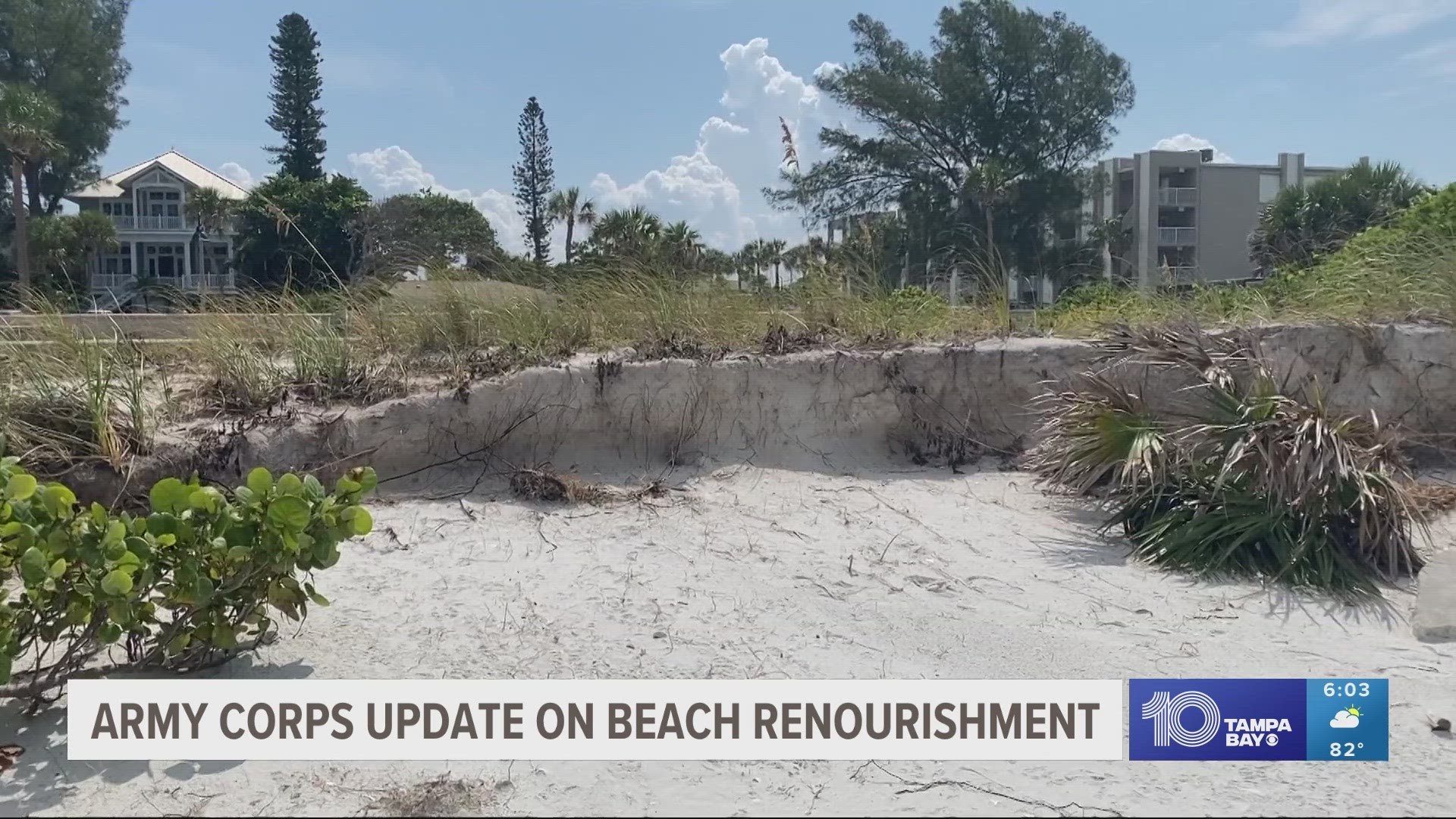INDIAN SHORES, Fla — On Friday, the public finally heard from the Army Corps of Engineers on where Pinellas County’s beach renourishment projects stand. Following Hurricane Idalia — severely eroded beaches lost even more sand — leaving many accesses closed.
Beach renourishment projects have been on pause in Pinellas County because of perpetual property easements. These easements must be signed by beachfront homeowners in areas zoned for renourishment in Sand Key, Long Key and Treasure Island. The easement gives the Army Corps rights to access the land, indefinitely.
The Army Corps of Engineers made their stance clear— without 100% compliance with easements, no sand will be pumped onto Pinellas County shores.
"But at this time, the Corps is not going to be able to do any work on any of these three segments until we can get them policy-compliant with the perpetual storm easements," Colonel James Booth, the Jacksonville division district commander said.
The meeting, held at the Indian Shores municipal building, had the room beyond capacity, with many residents and local officials wanting answers.
"Let's define the public access piece," René Flowers, a Pinellas County commissioner said.
Many residents are hesitant to sign the easements because of concerns with the definition of "public access," and the fact that it is in perpetuity. When asked if the Army Corps of Engineers would consider altering the language in the easements, here's what they said:
"I think what I can say is that I will take the information and the feedback that we heard today and talk to leadership throughout the Army Corps of Engineers, and [take that] for consideration," Booth said. " I can't speak to what kind of policy changes might occur or if any policy changes would occur. "
Pinellas County Commissioner Kathleen Peters highlights contradicting policies the Army Corps is adhering to. There is a policy that requires flexibility from the Corps.
"It states in the policy the Corps should not have rigid policies that affect the people, the environment, and the economy," Peters said. "I'm interpreting this as very rigid given these have been waived before..."
She's referring to the easements that used to not be a requirement for beach renourishment. Once the Army Corps transitioned into requiring them, it was waived in Pinellas County.
Booth explained what these easements do; stating property owners won't lose property rights in signing an easement.
"These easements give us access to property," Booth said. "The federal government does not take property, just access to the property."
Those refusing to give the Army Corps access to their land say the language needs to change before they can get on board with the project requirements.
"Had it been written a little differently, I would have signed gladly and probably brought you refreshments out while you're working," Katrina Hale, a beachfront property owner said. "But when you're telling me 'in perpetuity' and 'public access' honey-- I have enough trouble keeping the public off my property already."
Booth said it's unlikely the Army Corps will change its policy on requiring property easements.
A few things were clarified. When a homeowner signs an easement, they’re signing a portion of their property access over to the county, not the Corps.
The Army Corps' reason these easements are perpetual is so that if a storm devastates a beach, the Army Corps can come in, at an unscheduled time, to re-nourish it without having an issue of being on private property. The easements, according to the Corps, are required because the Army Corps cannot use federal dollars on private property, hence the need for public access easements.
For a map of all the homes that have and have not signed the easements, click here.
Malique Rankin is a general assignment reporter with 10 Tampa Bay. You can email her story ideas at mrankin@10tampabay.com and follow her Facebook, Twitter, and Instagram pages.

